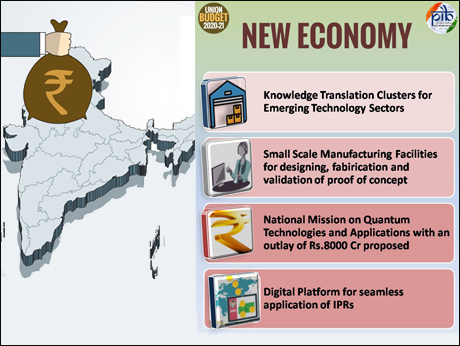
Bangalore, February 2 2020: To leverage disruptive innovations of the ‘New Economy’ like Artificial Intelligence (AI), the Indian budget for 2020-21, has allocated funds for a number of projects from technology clusters in villages to beefing up Bharatnet to a new policy for data centre parks.
The biggest allocation is Rs 8000 crores ( Rs 80 billion or US$ 1.12 billion) over a period of five years for a National Mission on Quantum Technologies and Applications.
This is similar to the other billion dollar allocation 4 years ago (at the then cost of Rs 4500 crores/ Rs 4.5 million) for the National Supercomputing Mission which has been largely spent till date on the outright import of multiple Bull Sequana high performance platforms from France-based Atos, rather than developing any indigenous technology. It remains to be seen how government intends to spend the money allocated for Quantum Computing -- the latest buzzword in supercomputing that it has embraced.
Touting the cliche: ‘data is the new oil’, the Finance Minister announced that a policy to enable private sector in building Data Centre Parks throughout the country, would soon be in place, " to incorporate data in every step of their value chains".
Government also proposes to link 100,000 gram panchayats or village councils, this year with Fibre to the Home (FTTH) connections through Bharatnet. This will fulfill the vision of providing digital connectivity to all public institutions, like Anganwadis, health and wellness centres, government schools, etc. The allocation is Rs. 6000 crore ( Rs 60 billion) for 2020-21.
Underscoring the importance of intellectual property creation and protection, the budget declared government's intention to promote a digital platform that would facilitate seamless application and capture of IPRs. A Centre is also proposed to be established in an "Institute of Eminence" for working on innovation in the field of Intellectual Property, together with Knowledge Translation Clusters across different technology sectors including new and emerging areas and Technology Clusters, with test beds and small scale manufacturing facilities for designing, fabrication and validation of proof of concept. There is no budgetary provision for any of this -- one can safely assume that this is just an open ended statement of intent at this point to bolster the government's intention of being seen to embrace what it calls New Economy ( see its infographic atop this article).
Says Satya Easwaran, Partner and Leader, Markets Enablement and Leader - Technology, Media and Telecom, KPMG in India: "In Budget 2020, technology has been clearly recognised as both a disruptor and enabler of new models of business and lifestyles. The government is looking to the future and the next generation of quantum technologies with the announcement of INR 8,000 crore for further R&D in this field."
Comments Prof Arogyaswami Paulraj, Professor Emeritus in Electrical Engineering at Stnaford University ( US), patent holder in key communication technology technologies like MIMO and an adviser to the Indian Government on its 5G roadmap:
"Quantum Computing (QC) has been in development in Europe and US for nearly two decades, but attracting increasing investments recently. Practical QC technology is perhaps still 5 to 10 years out. QC has the potential to speed up certain classes of computation that are impossible with current digital computers. There has been some skepticism about whether QC will ever become practical, but those doubts, not yet extinguished, are beginning to fade. The budget provision of Rs 8000 cores over five years will put India’s investments in QC in the league of China, US and Europe. Our current base in this technology is small and this massive investment is a great opportunity for Indian science."